 W
WThe military history of the United States during the Korean War began in the context of the defeat of Japan by the Allied Powers in World War II which heralded the end to 35 years of Japanese occupation of the Korean Peninsula and led to the peninsula being divided into two zones; a northern zone occupied by the Soviet Union and a southern zone occupied by the United States. After negotiations on reunification failed, the latter became the Republic of Korea or South Korea in August 1948 while the former became the Democratic People's Republic of Korea or North Korea in September 1948.
 W
WAll the Young Men is a 1960 Korean War feature film directed by Hall Bartlett and starring Alan Ladd and Sidney Poitier dealing with desegregation in the United States Marine Corps. Poitier plays a sergeant unexpectedly placed in command of the survivors of a platoon in the Korean War. The film explores the racial integration of the American military, centering on the African-American sergeant's struggle to win the trust and respect of the men in his unit.
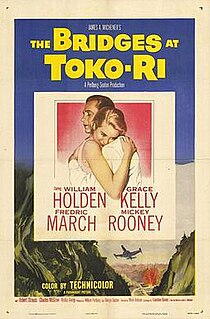 W
WThe Bridges at Toko-Ri is a 1954 American war film about the Korean War and stars William Holden, Grace Kelly, Fredric March, Mickey Rooney, and Robert Strauss. The film, which was directed by Mark Robson, was produced by Paramount Pictures. Dennis Weaver and Earl Holliman make early screen appearances in the motion picture.
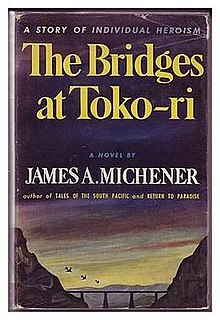 W
WThe Bridges at Toko-Ri (1953) is a novella by American author James A. Michener. The book details the experiences of United States Navy pilots in the Korean War as they undertake a mission to destroy heavily protected bridges in enemy territory.
 W
WThe Defense Production Act of 1950 is a United States federal law enacted on September 8, 1950 in response to the start of the Korean War. It was part of a broad civil defense and war mobilization effort in the context of the Cold War. Its implementing regulations, the Defense Priorities and Allocation System (DPAS), are located at 15 CFR §§700 to 700.93. Since 1950, the Act has been reauthorized over 50 times. It has been periodically amended and remains in force.
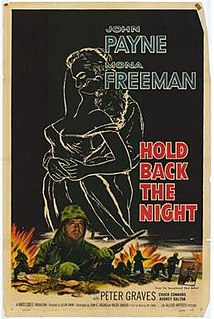 W
WHold Back the Night is a 1956 American war film about the Korean War based on the 1951 novel by Pat Frank, who had been a war correspondent in Korea. The film was directed by Allan Dwan; his third film with John Payne and his third film about the United States Marine Corps, the others being Abroad with Two Yanks (1944) and Sands of Iwo Jima (1949).
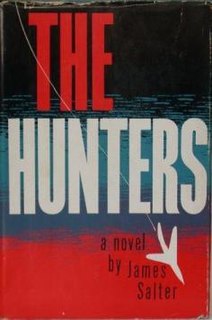 W
WThe Hunters is James Salter's debut novel and a tale of USAF fighter pilots during the Korean War, first published in 1956. The novel was the basis for the 1958 film adaptation of the novel starring Robert Mitchum and Robert Wagner with a different storyline.
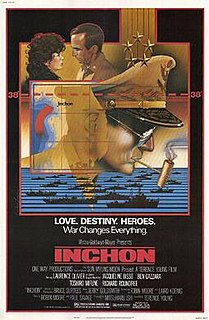 W
WInchon is a 1981 epic war film about the Battle of Inchon, considered to be the turning point of the Korean War. The film was directed by Terence Young and financed by Unification movement founder Sun Myung Moon. It stars Laurence Olivier as General Douglas MacArthur, who led the United States surprise amphibious landing at Incheon, South Korea in 1950. Also featured are Jacqueline Bisset, Ben Gazzara, Toshiro Mifune, and Richard Roundtree. It was filmed in South Korea, California, Italy, Ireland and Japan.
 W
WM*A*S*H is a 1970 American black comedy war film directed by Robert Altman and written by Ring Lardner Jr., based on Richard Hooker's 1968 novel MASH: A Novel About Three Army Doctors. The picture is the only theatrically released feature film in the M*A*S*H franchise, and it became one of the biggest films of the early 1970s for 20th Century Fox.
 W
WM*A*S*H is an American war comedy-drama television series that aired on CBS from 1972 to 1983. It was developed by Larry Gelbart as the first original spin-off series adapted from the 1970 feature film M*A*S*H, which, in turn, was based on Richard Hooker's 1968 novel MASH: A Novel About Three Army Doctors. The series, which was produced with 20th Century Fox Television for CBS, follows a team of doctors and support staff stationed at the "4077th Mobile Army Surgical Hospital" in Uijeongbu, South Korea, during the Korean War (1950–53).
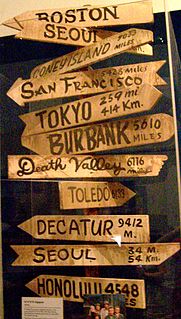 W
WM*A*S*H is an American media franchise consisting of a series of novels, a film, several television series, plays, and other properties, and based on the semi-autobiographical fiction of Richard Hooker.
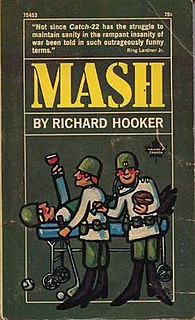 W
WMASH: A Novel About Three Army Doctors is a 1968 novel by Richard Hooker which is notable as the inspiration for the feature film M*A*S*H (1970) and the TV series of the same name (1972–1983). The novel is about a fictional U.S. Mobile Army Surgical Hospital in Korea during the Korean War.
 W
WMen in War is a 1957 black and white American war film about the Korean War directed by Anthony Mann and starring Robert Ryan and Aldo Ray as the leaders of a small detachment of American soldiers cut off and desperately trying to rejoin their division. The events of the film take place on one day; 6 September 1950. The picture was based on a 1949 World War II novel of the Normandy campaign Day Without End by Van Van Praag that was retitled Combat in 1951. Made soon after the end of the Korean War it was still very much in the minds of the American public.
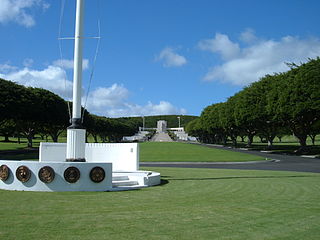 W
WThe National Memorial Cemetery of the Pacific is a national cemetery located at Punchbowl Crater in Honolulu, Hawaii. It serves as a memorial to honor those men and women who served in the United States Armed Forces, and those who have given their lives in doing so. It is administered by the National Cemetery Administration of the United States Department of Veterans Affairs and is listed on the National Register of Historic Places. Millions of visitors visit the cemetery each year, and it is one of the most popular tourist attractions in Hawaii.
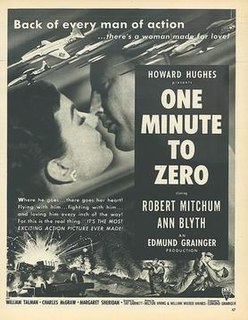 W
WOne Minute to Zero is a 1952 romantic war film starring Robert Mitchum and Ann Blyth, set during the opening phases of the Korean War, and produced by Howard Hughes as his last film as producer. The film showcases the contributions of the U.S. Army and U.S. Air Force, the South Korean Army, the United Nations, the British Army and the Royal Australian Air Force during the early days of the Korean War. The effects of air power in the Korean War were also vividly depicted through the use of combat footage.
 W
WThe Oregon Korean War Memorial is a war memorial located in Wilsonville, Oregon, United States. Completed in 2000, it honors the Oregon soldiers and the Korean people from the Korean War. The memorial is located within a 5.5-acre (22,000 m2) city park and features a 109-foot (33 m)-long granite wall that includes the names of those Oregonians who died or were listed as missing from the war.
 W
WThe Philadelphia Korean War Memorial at Penn's Landing in Philadelphia was initially dedicated on June 22, 2002 and was formally rededicated on Memorial Day, May 28, 2007 after additional work was completed. Each name of the more than 600 servicemen who were killed in action or listed as missing in action during the Korean War from Bucks, Chester, Delaware, Montgomery, and Philadelphia counties are etched in the memorial. Veterans Day and Memorial Day services are held onsite annually.
 W
WPork Chop Hill is a 1959 American Korean War film starring Gregory Peck, Woody Strode, Rip Torn and George Peppard. The film, which was the final war film directed by Lewis Milestone, is based upon the book by U.S. military historian Brigadier General S. L. A. Marshall. It depicts the first fierce Battle of Pork Chop Hill between the U.S. Army's 7th Infantry Division and Chinese and North Korean forces in April 1953.
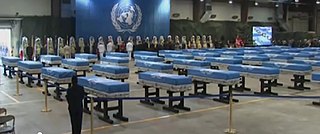 W
WThe recovery of US human remains from the Korean War has continued since the end of the war.
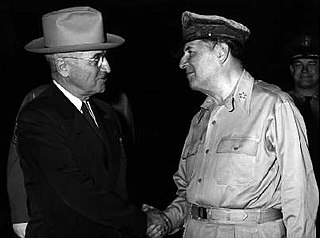 W
WOn 11 April 1951, U.S. President Harry S. Truman relieved General of the Army Douglas MacArthur of his commands after MacArthur made public statements which contradicted the administration's policies. MacArthur was a popular hero of World War II who was then commander of United Nations Command forces fighting in the Korean War, and his relief remains a controversial topic in the field of civil–military relations.
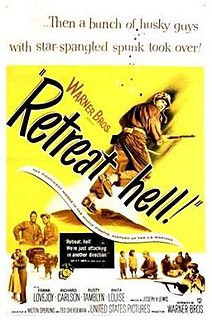 W
WRetreat, Hell! is a 1952 American war film about the 1st Marine Division in the Korean War, directed by Joseph H. Lewis. It stars Frank Lovejoy as a career Marine battalion commander who is recalled from work at an American embassy, Richard Carlson as a veteran captain and communications specialist of World War II called up from the Marine Corps Reserves, Russ Tamblyn as a seventeen-year-old private who hides his true age to serve with the unit overseas and outdo his older brother, also a Marine, and Nedrick Young. Also appearing in the film is Peter Julien Ortiz, a highly decorated Marine who served in the Office of Strategic Services (OSS) and appeared in various films after retiring from the military.
 W
WSan Joaquin Valley National Cemetery is a United States National Cemetery located at 32053 West McCabe Road, Santa Nella, in Merced County, California. This cemetery has space available to accommodate casketed and cremated remains over 322 acres (130 ha) of land. The number of interments through fiscal year 2008 is 30,054.
 W
WThe Steel Helmet is a 1951 American war film directed, written, and produced by Samuel Fuller during the Korean War. The cast stars Gene Evans, Robert Hutton, Steve Brodie, James Edwards, and Richard Loo. It was the first American film about the war, and the first of several war films by Fuller.
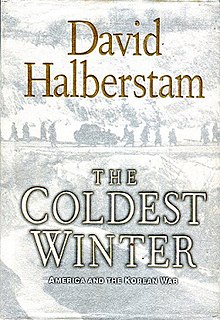 W
WThe Coldest Winter: America and the Korean War is a non-fiction book by the author David Halberstam. It was published posthumously in 2007, after his sudden death in a traffic collision at the age of 73.
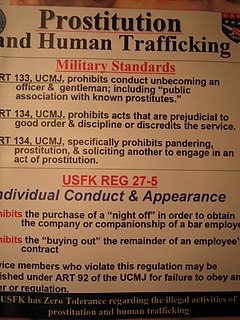 W
WDuring and following the Korean War, the United States military used regulated prostitution services in South Korean military camptowns. Despite prostitution being illegal since 1948, women in South Korea were the fundamental source of sexual services for the US military and a component of Korean-American relations. The women in South Korea who served as prostitutes are known as kijichon (기지촌) women, also called as "Korean Military Comfort Women", and were visited by the US military, Korean soldiers, and Korean civilians. The prostitutes were from Korea, Philippines, China, Vietnam, Thailand, Sri Lanka, Nepal, Indonesia, and the Commonwealth of Independent States, specifically Russia and Kazakhstan. Also from Ukraine.
 W
WThe Korean War Veterans Memorial is located in Washington, D.C.'s West Potomac Park, southeast of the Lincoln Memorial and just south of the Reflecting Pool on the National Mall. It memorializes those who served in the Korean War.